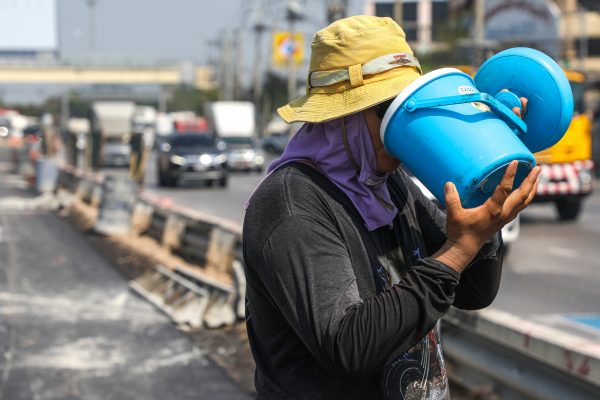Embattled Thai protest movement awaits new “sparks”

March has been a bad month for the anti-establishment network, so far at least. Its public support has continued to decline, the royal portrait burning incident has planted more doubts among the neutrals, top “guards” have been arrested, key leaders have been put behind bars and “donation” controversies have rattled some instrumental figures.
To add to that, the issue of “violence” has not been properly addressed. A convoy of police trucks transporting detainees alleged to be preparing to wreak havoc on the streets was assaulted last Saturday. One of the trucks had its back door pried open and several of those arrested were seen leaving the vehicle. Meanwhile, many photos were burned outside the Criminal Court, cementing an image of aggression and extremism, and exposing many to possible legal action.
Social academic Sulak Sivaraksa, 88, and former university rector Charnvit Kasetsiri, 80, both of whom key idols of young protesters, have made their presence at rally sites but their statuses have failed to re-boost the momentum. Many people think their “emergence” confirms that the movement has been in disarray and requires refreshing.
The donation controversy is revolving around a movie star who has been regarded as an “angel of the protesters”, and it has come hot on the heels of setbacks on the image of another iconic figure of the protest movement. Over the past few months, Thanathorn Juangroongruangkit suffered major political and legal blows concerning an aborted and fishy land deal involving his younger brother, land owned by himself and his mother, and the existence of a luxurious yacht.
Good news for the protesters is that possibilities of new “sparks” are all aplenty, and some may even come early. The issue of charter amendment, which can always be a rallying cry, is plastered in the March calendar. It begins with a Constitutional Court decision on how far Parliament can go in producing a new charter.
The court’s verdict, and how Parliament reacts to it, can be a game changer. Thailand’s political divide is reaching another monumental moment, so to speak.
The judges have received written expert opinions on how the charter can be reviewed and rewritten. A court decision against the unorthodox idea of electing another body to replace Parliament in virtually writing a new charter could generate a major shockwave against what the protesters want, what the government has reluctantly agreed to do, and what the House of Representatives has been doing. But even if the court gives a green light for the setting up of such an assembly, Parliament’s final vote, scheduled for the second half of this month, could still derail the whole plan.
The Constitutional Court’s intervention had been sought by a government MP who won considerable backing. The development has been decried by certain parliamentary opposition figures as an attempt to buy time or even to torpedo the entire process. Whether the suspicion was true or not, the current political backdrop is quite different from when the unusual charter amendment plan was floated. At that time, protesters were at the height of their power, senators were all but silent, and the government was on the back foot.
Both the Constitutional Court verdict and Parliament’s fateful final say will come this month, and whatever transpires will be heavily linked to what happens on the streets. The embattled protesters, logistically hurt and politically bruised, can see that as an opportunity, or they may curse the timing. Either way, the second half of March is very interesting to watch.
By Tulsathit Taptim






